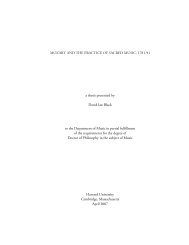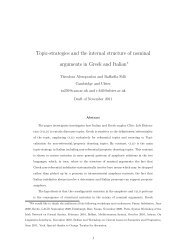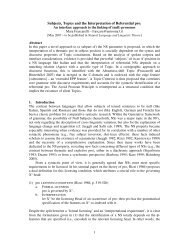Provisional Drogereit pdf
Provisional Drogereit pdf
Provisional Drogereit pdf
Create successful ePaper yourself
Turn your PDF publications into a flip-book with our unique Google optimized e-Paper software.
By comparing script-types he found evidence of two scribes (p. 339) who composed<br />
several charters for different recipients 25 . This paved the way for a diplomatic Sickletype<br />
study, the foundation for the current work, for which we have A. Hessel to<br />
thank 26 .<br />
The view that there was a chancery has recently been held both by B. Wilkinson 27 ,<br />
probably without knowledge of Hessel’s work, and F. Kirn 28 . Recently, in his brief<br />
explanation, where he rejects Brunner’s version of the land book, H. Hazeltine<br />
endorsed L. Larson’s view 29 .<br />
In addition to these studies, which consider charters extensively, we also have works<br />
that handle the issue in a purely historical context. Some of these also deserve a<br />
mention in our examination.<br />
When G. Philipps attempted to portray the history of Anglo-Saxon law, he also<br />
touched on the “cancellarius”. He presumes that this court appointment came to<br />
England through the connection with the Franconian court. Furthermore he knows<br />
that there were several notaries under the chancellor who were also called<br />
secretaries 30 . J. Lappenberg, who has already been mentioned, also agrees with the<br />
historians of the 18 th and early 19 th Centuries who believed in the existence of a royal<br />
chancery 31 . J. R. Green had the issuers of charters start with Knut.<br />
25 A. Hessel, Studien zur Ausbreitung der karolingischen Minuskel, (Studies on the increasing use of<br />
the Carolingian miniscule), in A. f. U VIII, pp. 17 ff. Berlin-Leipzig 1923.<br />
26 At this point I would like to express my most sincere thanks to Professor Hessel for his constantly<br />
helpful participation in the progress of this work, together with Mr Geh. Rat Brandi, Professor Hecht<br />
and Professor Schramm for their stimuli, which was necessary to the organisation of the study.<br />
27<br />
B. Wilkinson, The Chancery under Edward III, in Publications of the University of Manchester,<br />
Historical Series 51, p. 2.<br />
28 F. Kirn, Zum Problem der Kontinuität zwischen Altertum und Mittelalter, (The problem of<br />
continuity between antiquity and the Middle Ages), in A. f. U. X, p. 137. Berlin 1930.<br />
29 D. Whitelock, Anglo-Saxon Wills, in Cambridge Studies in English Legal History 6, Cambridge<br />
1930. See p. XXIX ff. of the Preface by H. Hazeltine, especially p. XXXII, n. 3. His view of the<br />
character of the landbook can be summarised as follows: “...that the land-book was used, like the sod<br />
taken from the land, merely as a symbol which represented the land...” and “Since the pressure of<br />
Germanic custom in Anglo-Saxon days made for orality... the land-book...was...a document which<br />
merely evidenced a German oral transaction that was complete without a writing.” (For a critique cf.<br />
H. Meyer, Z. f. RG., G. A. Vol. 51, p. 695 f.)<br />
30 G. Philipps, Versuch einer Darstellung der Geschichte des angelsächsischen Rechts (An attempt to<br />
portray the history of Anglo-Saxon Law), Göttingen 1825, p. 47 and Note 249. The references quoted<br />
by him are now, since Hall, untenable. Without specifying a reference he states on p. 78, Note 250:<br />
“Turketulus, Abbot of Croyland, as he was to become, nephew of Edward the Elder, was King Edred’s<br />
Chancellor before he joined the clergy.” (From Ingulph or Spielmann, Glossarium, p. 105: De<br />
Cacellario apud Anglo-Saxones, which contains a whole list of Anglo-Saxon Chancellors.)<br />
31<br />
J. M. Lappenberg and R. Pauli, Geschichte von England (History of England), 5 Vols. Hamburg<br />
1834-58. Vol. I, p. 566 (after Philipps)<br />
339
















